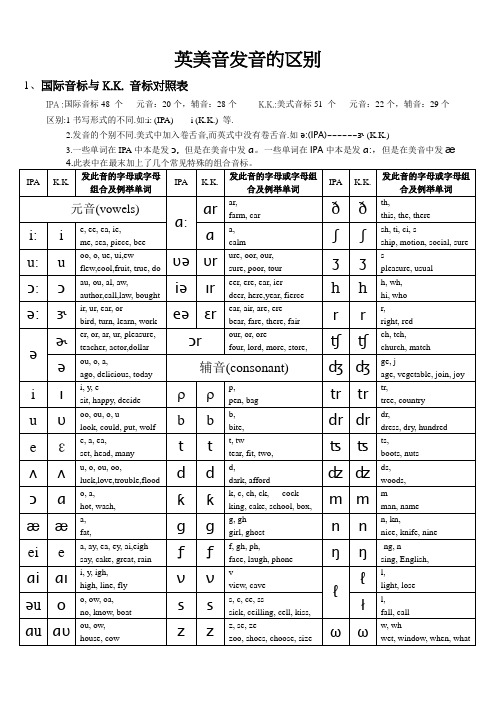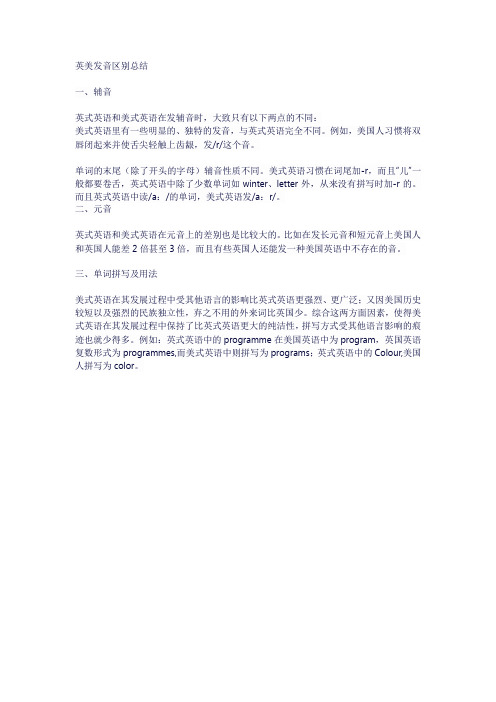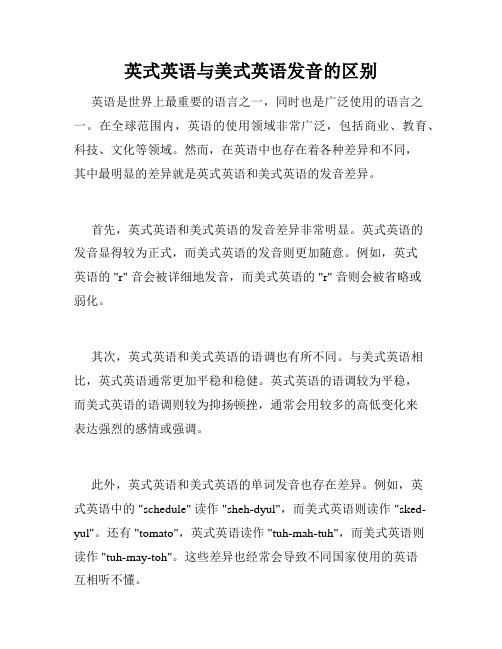2016届高考英语英式和美式英语的主要发音拼写与表达的差别素材
英式英语和美式英语的差异

3词汇 1完全异义 例如:public school 在美国指公立学校,但在英式英语却是指私立学校。再如cupboard在英式英语是指壁橱,而在美国英语中则指厨房或吃饭间的食橱。 2同义异词 英语与美语对比如下:打电话ring/call;钞票note/bill;电影film/movie;足球football/soccer,汽油petrol/gas,地铁underground/subway,罐头fin/can,股票shares/stock,货摊stands/booth等。
单击此处可添加副标题
语言是客观世界的真实写照,是一种社会现象。人们生活、劳动在一种什么样的环境中,就会产生什么样的语言。一定的文化实体总是存在于一定的地域空间内, 不可避免地体现了该地域的自然面貌特点。由于美国和英国在地理环境、社会生活及风俗习惯方面仍有某些差异,美国中的某些词在英国中就不存在。美国国土幅员辽阔,地形变化万千。例如,caribou(北美的驯鹿),英国四面环海,岛国人的生活与海洋和水运事业有着密切的关系。对海洋的依赖与发展决定了航海民族务必使用大量与海有关的语汇,如 plain sailing (一帆风顺),go with the stream (随波逐流),on the rocks (触礁), 等。英国西临大西洋,东面欧洲大陆。欧洲大陆北部袭来的东风寒冷刺骨,大西洋徐徐吹来的西风则温暖宜人,因此才有桂冠诗人曼斯菲尔德的“It’s a warm wind, the west wind, full of bird crying.” 而反过来说,英国英语中的某些词在美国英语中也找不到,如prince (王子), duke(公爵),marquis(侯爵),knight(骑士)等词都是英国英语所特有的。
英式英语与美式英语差异
英式英语与美式英语差异的表现 虽然美式英语是从英式英语演变而来的,但是由于两者之间的历史、文化、经济发展的不同,从而导致英式英语与美式英语之间的差异,主要的差异表现如下:
英美音发音的区别(完整版)

英美音发音的区别1、国际音标与K.K. 音标对照表IPA :国际音标48 个元音:20个,辅音:28个K.K.:美式音标51 个元音:22个,辅音:29个区别:1书写形式的不同.如:i: (IPA)------i (K.K.) 等.2.发音的个别不同.美式中加入卷舌音,而英式中没有卷舌音.如ə:(IPA)------ɝ(K.K.)3.一些单词在IPA中本是发ɔ, 但是在美音中发ɑ。
一些单词在IPA中本是发ɑ:,但是在美音中发æ2、英美音发音的区别差别一:美音中所有元音字母后的r字母全部要卷舌。
如early w ork four firstThe early bird catches the worm.=Someone is successful because they were the first to do something.早起的鸟儿有虫吃。
捷足先登。
差别二:通常情况下,在英音中发/ɑ/音且后面没有接“r”的字母,美音读成/æ/。
如ask pass lastcan Winter is past and spring has come at last. 冬天过去了,春天终于来临了。
差别三:小嘴变大嘴。
通常情况下,英音中短/ɔ/在美音中基本变成了大嘴的/ɑ/音。
如possible b oss n ot . Nothing is impossible.没有什么不可能You’re the boss.你做主差别四:通常情况下,在美音中尾音“tle”和“ter”的/t/几乎读成了/d/。
如little betterI hope you will be better soon. 我希望你能很快好起来。
(注:文档可能无法思考全面,请浏览后下载,供参考。
可复制、编制,期待你的好评与关注)。
英美发音区别总结

英美发音区别总结
一、辅音
英式英语和美式英语在发辅音时,大致只有以下两点的不同:
美式英语里有一些明显的、独特的发音,与英式英语完全不同。
例如,美国人习惯将双唇闭起来并使舌尖轻触上齿龈,发/r/这个音。
单词的末尾(除了开头的字母)辅音性质不同。
美式英语习惯在词尾加-r,而且“儿”一般都要卷舌,英式英语中除了少数单词如winter、letter外,从来没有拼写时加-r的。
而且英式英语中读/a:/的单词,美式英语发/a:r/。
二、元音
英式英语和美式英语在元音上的差别也是比较大的。
比如在发长元音和短元音上美国人和英国人能差2倍甚至3倍,而且有些英国人还能发一种美国英语中不存在的音。
三、单词拼写及用法
美式英语在其发展过程中受其他语言的影响比英式英语更强烈、更广泛;又因美国历史较短以及强烈的民族独立性,弃之不用的外来词比英国少。
综合这两方面因素,使得美式英语在其发展过程中保持了比英式英语更大的纯洁性,拼写方式受其他语言影响的痕迹也就少得多。
例如:英式英语中的programme在美国英语中为program,英国英语复数形式为programmes,而美式英语中则拼写为programs;英式英语中的Colour,美国人拼写为color。
英式英语与美式英语发音的区别

英式英语与美式英语发音的区别英语是世界上最重要的语言之一,同时也是广泛使用的语言之一。
在全球范围内,英语的使用领域非常广泛,包括商业、教育、科技、文化等领域。
然而,在英语中也存在着各种差异和不同,其中最明显的差异就是英式英语和美式英语的发音差异。
首先,英式英语和美式英语的发音差异非常明显。
英式英语的发音显得较为正式,而美式英语的发音则更加随意。
例如,英式英语的 "r" 音会被详细地发音,而美式英语的 "r" 音则会被省略或弱化。
其次,英式英语和美式英语的语调也有所不同。
与美式英语相比,英式英语通常更加平稳和稳健。
英式英语的语调较为平稳,而美式英语的语调则较为抑扬顿挫,通常会用较多的高低变化来表达强烈的感情或强调。
此外,英式英语和美式英语的单词发音也存在差异。
例如,英式英语中的 "schedule" 读作 "sheh-dyul",而美式英语则读作 "sked-yul"。
还有 "tomato",英式英语读作 "tuh-mah-tuh",而美式英语则读作 "tuh-may-toh"。
这些差异也经常会导致不同国家使用的英语互相听不懂。
最后,英式英语和美式英语的口音也存在差异。
口音方面,英式英语通常用较多的 "u" 音,而美式英语则更多地使用 "o" 音。
此外,美式英语中的某些音也比英式英语更加平滑和柔和。
总之,英式英语和美式英语的发音差异非常明显,这主要源于两个国家不同的历史和文化背景。
虽然两者之间的区别有时可能会导致沟通不畅,但实际上,这些差异也反映了人类语言多样性和语言环境的多元化。
对于学习英语的人来说,了解这些区别是非常有用的,可以帮助人们更好地理解和掌握英语这门语言。
发音训练掌握英美发音差异

发音训练掌握英美发音差异英美发音差异一直是学习英语的难点之一。
由于发音方式的不同,英国人和美国人在讲英语时会存在一些明显的差异。
掌握这些差异是提高口语表达准确性的重要一步。
本文将介绍一些常见的英美发音差异,并给出相应的发音训练方法。
一、元音音素差异1. /æ/音在英国英语中,/æ/音(如“cat”)发音较为开口,舌尖抵近下齿龈。
而在美国英语中,/æ/音会发音得更封闭,舌尖抵近上齿龈。
练习时,可以通过不断比较和模仿两种发音方式来加强准确性。
2. /ɑː/音英国英语中的/ɑː/音(如“bath”)发音较为明显,舌尖靠近下齿龈,口腔形成较大的圆形。
而在美国英语中,/ɑː/音会变为/æ/音(如“bat”)的发音。
训练时,可尝试用英国口音和美国口音分别发出这两个词,逐渐熟悉两种发音方式的差别。
3. /ɔː/音在英国英语中,/ɔː/音(如“sauce”)的发音会比较圆润,舌尖轻触下齿龈。
而在美国英语中,/ɔː/音可能会变为/ɑː/音(如“saw”)的发音。
通过模仿和反复练习不同发音方式,可以提高自己的发音准确性。
二、辅音音素差异1. /r/音在英国英语中,/r/音往往是非常轻微的,舌尖不接触任何部位。
而在美国英语中,/r/音会发音得更清晰和重一些,舌尖轻轻接触上齿龈。
为了掌握这一差异,可以尝试在两种发音方式之间切换,反复训练。
2. /t/音在英国英语中,/t/音(如“water”)在单词末尾时较为轻声,常被简化为/glottal stop/音。
而在美国英语中,/t/音会发出清晰的爆破音。
为了熟悉这两种不同的发音方式,我们可以通过大量听力练习和模仿来加强技巧。
3. /θ/和/ð/音在英国英语中,/θ/音(如“think”)的发音明显,/ð/音(如“this”)在语句中发音为辅音/d/。
而在美国英语中,/θ/音通常会通过舌尖接触上齿龈来发音,/ð/音会发出辅音/z/的音。
英式英语和美式英语之别——拼写篇

英式英语和美式英语之别——拼写篇英式英语和美式英语在拼写上有几点基本上的差别。
英式英语试图保持一些单词缘起的样貌,如一些源自法语的词汇,而美式英语调整了拼写方式,以便更好地对应单词的真实发音,这是造成很多不同的原因之一。
如果你写作的材料是面对英国读者,应该仅采用英式拼写。
一些情况下,美式拼写在英式英语中也能接受,如以-ize/-ization 结尾的美式单词,在英式英语中两种拼写,即-ise/-isation 和-ize/-ization 都行。
但需注意,同一篇文章中要始终坚持一种风格。
如视频中所示,英式和美式英语有几处主要的拼写差异:以 -re 结尾的单词:英式英语拼写为-re,在美式英语中多为-er。
英式美式centre centerfibre fiberlitre litertheatre theater 或 theatre以-our 结尾的单词:英式英语拼写为-our,在美式英语中多为-or。
英式美式colour colorflavour flavorhumour humorlabour laborneighbour neighbor以 -ize 或 -ise 结尾的单词:英式英语中两种拼写都可以接受,在美式英语中只拼做-ize。
英式美式apologize 或 apologise apologizeorganize 或organise organizerecognize 或recognise recognize以 -yse 结尾的单词:英式英语中以-yse结尾的动词,在美式英语中总是拼为-yze。
英式美式analyse analyzebreathalyse breathalyzeparalyse paralyze以元音+ l 结尾的动词:英式英语中做动词变化时会双写字母l,而美式英语不会双写l。
英式美式travel traveltravelled traveledtravelling travelingtraveller travelerfuel fuelfuelled fueledfuelling fueling单词拼写中出现双元音:英式英语中含有ae或oe双元音拼写时,美式英语中只是保留字母e。
英式英语和美式英语的发音区别
(一)单词中字母“r”发音――“卷舌”的标志显而易“听”,卷舌音是美音区别于英音的一大特色。
请注意:A 美音中除了Mrs.中的“r”不卷舌之外,只要含有“r”字母的单词均要卷舌。
美音英音Spare /speEr/ /speE/Burglar /bErglEr/ /bE:glE/Purpose /pErpEs/ /pE:pEs/(二)在美音中/t/发音与/d/相近注意:美音中/t/ 出现在两个元音之间且处于非重读位置的时候,发音近似/d/,而不是完全等同。
我们这里用/d/来表示这个近似音。
美音英音city /sidi/ /siti/better /beder/ /bete/pretty /pridi/ /priti/三)听辨美音中的/A/字母a的发音出现在-ss, -st, -th, -ff, -ef, -nce 等前面时,美音把a读为/A/美音英音can’t/kant/ /ka:nt/last /last/ /la:st/Mask /mask/ /ma:sk/Chance /tfans/ /tfa:ns/Advantage /edvantidv/ /edva:ntidv/ (四)由“hot dog”看字母“o”在美音中的发音字母“o”在美音读为/a/而在英音中读为/R/美音英音Bottle /batl/ /bCtl/Popular /papjule/ /pcpjule/Knock /nak/ /nck/Politician /palitifen/ /pclitifen/(五)字母u和ew在英音和美音的不同字母u和ew在l, d, n, t 之后,美音倾向于读/u/, 而英音倾向读/ju/美音英音Due /du:/ /dju:/Produce /predu:s/ /predju:s/attitude /atitu:d/ /atitju:d/student /stu:dent/ /stju:dent/。
英国英语和美国英语在拼写和发音的异同
Differences between British English andAmerican EnglishAbstract:British English and American English are the two most important variants of the English language. They influence each other and are mutually complementary. Due to the historical, political, cultural and environmental factors, the two language variations have some differences in various aspects. These varieties may be regional or national. To understand the differences between American English and British English and to grasp their rules are very important .This paper will describe the differences in the following aspects: pronunciation, spelling, vocabulary, grammar, and usage.I . IntroductionNowadays, English is popular around the world, which has experienced great changes during a long time of American colonization, English has been the language of the United States. From then on, English language were grouped into two major kinds, British English and American English, which have their own characteristics. As time the time goes, America begins take part in international affairs. Especially, America plays a important role in international stage fromSecond World War to now. Recent 20 years, American English develops quickly in politics, economy, culture, education and so on. So American English develops rapidly, and is discussed and studied in world.In modern society, some people think learning American English is fashionable, but the concept of differences must not be taken too far, because British English and American will be two major varieties of one language, not two different languages, with the development of modern science, technology, mass media, the differences between these two nations are becoming smaller. In practice, the tendency is towards better understanding between the people of the two countries. In order to help the English learners better understand the differences between British English and American English, this paper tries to analyse the main differences between British English and American English in pronunciation, spelling, vocabulary, grammar, and usage.II.pronunciation differences :There are a number of easy-to-hear differences in the way that English is pronounced by British and American speakers. Here we will look at the following areas :British and American speakers have different stress patterns in their speech when they say certain words with two or more syllables. For example:In words with several syllables like secretary, American speakers emphasize the ending more than British speakers, so that the word seems to have an extra syllable:Americans retain the “r” at the end of the words. For example:III. Spelling differences:Most vocabulary’s spelling in the two languages are the same, but there are a few words’ spelling obvious differences. Some of the differences are the result of the development of American English, especially in the 19th century when Doctor Webster put the American characters into British English and American English on the spelling of old English. Anyway, there is regularity in the different spelling of British English and American English.a. American spelling always avoids the repetition of the letter of consonant. Generally, “ l ” is not doubled in American English. For example:BE: traveller, levellingAE: traveler, levelingb. Some words end in “-ter” in American English, and “-tre” in British English. For example:BE: theatre, centreAE: theater, centerc. Some words end in “-or” in American English, and “-oure” in British English. For example:BE: labour, honour, colour, humourAE: labor, honor, color, humord. American spelling always omits the un-pronounced letters. For example:BE: catalogue, axe, dialogue, good-byeAE: catalog, ax, dialog, good-byIV. Differences in vocabulary and meaningDue to the differences in the population structure, physical environment, social and economic conditions, American English has diverged somewhat from British English. Most vocabulary in British English and American English have the same meaning. Few words reflect the differences in vocabulary and meaning. There are three important types of differences in the meaning of words in the two varities.A. The same object may have the different names.Using different words to describe one meaning is the most obvious difference between British English and American English. Some of the biggest differences are in the words used for basic everyday things. For example:B. One word in different meaningsSome vocabulary developed individually in the two languages. This phenomenon make the words lost their basicmeaning and gradually obtained some new meanings. This finally changed the meaning of the vocabulary in the two languages.C. Words of cross meaningIt is a special phenomenon between the two former differences. A word may have different meanings in British English and American English But it may have the same meaning in its modification with anothe r word’s modification. Biscuit in British English means cookie in American English while biscuit in American English means scone. It is very interesting that dessert in American English means pudding in British English, while pudding in American English means custard in British English.Ⅴ.Grammar differences:British English and American English grammar is mostly in agreement; there are however some interesting variations.A. Americans use a simple past tense in some cases where British people use a present perfect.AE: He just went home.BE: He has just gone home.B. There are differences in certain verb forms :BE: fit-fittedAE: fit-fitC. Americans use the verb “ have ” a little differently from British people in some cases.BE: Have you got a cold?AE: Do you have a cold?D. Americans are much more likely to be technically correct in the agreement of collective noun and verb form than Britons.BE: The team are playing well.AE: The team is playing well.F. In informal speech, Americans sometimes use adverb forms witho ut “-ly”.AE: He looked at me real strange.BE: He looked at me really strangely.G. on the phoneBE: Hello , is that Jane?AE: Hello, is this Jane?Ⅵ.Usage differencesThere are countless other small and interesting differences between British English and American English, which come under the heading of usage. For example:For Americans the number billion has 9 zeros (a thousand million); for most Britons it has 12 zeros (a million million). Zero itself is a much more common word in AE than in BE, where nought is more widespread. Americans say the number 624 as six hundred twenty four, whereas in British it would be said six hundred and twenty four.ConclusionAmerican and British English will be two major variants of one language because of the similarities of the basic word stock, the basic grammar and the basic phonetic system, and because of rapid development of modern science, technology, mass media, and constant cultural and economic exchanges between these two nations.。
(完整版)美式英语与英式英语在发音上的差异
美式英语与英式英语在发音上的差异一、舌音1、过耳不忘之/r/音但凡略微接触过英音和美音的同学都知道,英音和美音最大的区别就是卷舌音!有些同学认为idea读成美音就是idea(r),famous在美音里面就是famou(r)s,但是这种读法是错误的!那么,问题来了,美音什么时候才会出现卷舌?是否美音里只有出现“r”才会卷舌?这个说法也不全面,具体情况且听笔者娓娓道来。
在英音中,字母r在元音前才发音,如red (红色)、run(跑),而在辅音前或词尾时是几乎不发音的,如farm(农场),car(汽车),例外情况就是a beer or a coke中的连读。
但在美语中,r在辅音前发明显的卷舌音,如park(公园),在词尾时亦发音,如star(星星)。
但是美音中也有特殊单词不符合这种发音规律:例如Mistress该单词的缩写形式Mrs就不符合美音中r在辅音前发明显的卷舌音的规则。
另外Colonel(上校)虽然没有“r”字母,但是在美音发音中却需要卷舌。
由此可见,各位同学需要在掌握一般性美音卷舌规则的基础上,把握特殊情况,如此方能卷的正确,卷的好听!2、似是而非之fast d弹舌音这种发音是酸梅汤老师在课上经常作为“炫技唬人”的绝杀招数。
在一部分非重读音节中(如ladder,cattle, letter,city,party),英音会清楚地发音“t”“d”两个音素,但在美音中“d”和“t”常常会被模糊成一个fast /d/音。
就中文而言,南方某些地区的方言中就存在这种发音,同时就其它的语言而言,西班牙语或者俄语中的“rolling r”音就趋同于美音中此种特殊发音,我们称之为弹舌音。
如果你既不身怀“绝技”,也不曾接触过西班牙语或俄语,那么你还是好好通过“原文链接”和酸老师好好学习或者规规矩矩按照音标念吧,可能不是很“美”,但至少不会很“乱”。
二、音变3、销魂音变之/æ/音在/ss/, /st/, /th/, /ff/, /nce/, /s/, /l/, /m/, /n/等辅音之前的字母a,美国英语一般读作/ æ / 音,而英国音则发作/a:/。
英国英语和美国英语读音的差异
英国英语和美国英语读音的差异英国人和美国人都使用英语。
在实际生活中,他们各自使用的英语都在不断地发展,致使这同一种语言在读音、词汇和语法方面都出现了一些分离和区别,从而语言名称也分成英国英语和美国英语(简称BE和AE)。
下面就谈谈两者在标准读音方面的一些区别。
BE和AE的读音区别主要表现在三方面:首先是元音的区别,其次是BE中的“不读音的r”和AE中“读音的r”的问题,最后是辅音字母的不同读音问题。
现在以较有代表性的读音区别为例,分述如下:一、元音上的区别1.BE中元音字母a发/a?>/的单词,在AE中往往发/$/,这是一个十分明显的差别。
这类词有150多个,以ask为代表,故也称“ask词”。
例如:例词 BEAEcalf /ka?>f//k$f/example /ig'za?>mpl/ /i g'z$mpl/chance /t M ns//t M ns/ask /a?>sk//$sk/path /pa?>θ/ /p$θ/从上述例词中,可以得出这样的规律:(1)两者发音不同的问题表现在处于重读音节的字母a上;(2)a后一般为/f/,/m/,/n/,/s/ 和/θ/,/δ/ 这几个辅音;(3)但重读闭音节中的 a后遇爆破音/t/,/d/,/k/,/g/,/p/,/b/或破擦音/t M/时,两种语言发音均相同,都发成/$/。
例如:例词 BE AEcat /k$t/ /k$t/bag /b$ g/ /b$g /catch /k$t M/ /k$t M/必须指出的是,例外在所难免,如n,m前的重读字母a,在不少情况下两种语言都读成/$/。
如:plan,sand,ramble,jam等。
2.BE单词中的元音发/&?>/或/&/时,在AE中相应发成/&/和/a/亦即后者的口型要大。
例词 BE AEhalt /h&?>lt/ /h</pause /p&?>z/ /p&z/fault /f&?>lt/ /f</从以上例词可以看出,这种发音区别往往表现在含有al,au,aul字母组合的单词中。
- 1、下载文档前请自行甄别文档内容的完整性,平台不提供额外的编辑、内容补充、找答案等附加服务。
- 2、"仅部分预览"的文档,不可在线预览部分如存在完整性等问题,可反馈申请退款(可完整预览的文档不适用该条件!)。
- 3、如文档侵犯您的权益,请联系客服反馈,我们会尽快为您处理(人工客服工作时间:9:00-18:30)。
英式和美式英语的主要发音拼写与表达的差别一、发音不同1、元音:英语和美语的发音最大的区别之一在它们对浑元音(schwa,音标中的倒写e)的处理。
英语中,浑元音在单元音中常通发生在一些非重读的短音a (如 about)和短音er(如computer)上。
美语中的er很少为浑元音,并有时对短音i(如sentimental, actuality)和u(如 wuss),甚至短音的oo(如:hooker)采用了浑元音。
(这四个例子在英语中的发音分别为[i], [i], [u:], [u])浑元音的读音是不定的,但是听起来差不多像一个急促的介于“俄”和“啊”的发音。
英语和美语的发音最具代表性的区别是对er的发音的不同。
英语中,短音的er是如上所述的浑元音,但长音的er也不过是个拉长了的浑元音,听起来是一个很夸张的介于“俄”和“啊”的声音。
而美语中,er听起来怎么都是个“儿”音(例外是一些俗语中发成浑元音)。
ar:除了轻读短音(如singular)和者后连元音(如clarity),英语的ar全部清一色的长音[a:],而美语中,是“阿尔”。
事实上,凡是有r在一个音节尾部的时候,美英发音通常都是不一样的,如tour(英:吐啊,美:吐儿),tear(英:踢啊,美:踢儿),pair(英:pe 啊,美:pe儿)。
甚至在刚才提到的clarity中,英语['kleriti],美语['kle儿r(er)ti] 。
元音的发音中还有一个比较重要的区别。
一是[o]音:短音的o(如often),英语中发音仅仅为一个缩短了的长音o(如or),而美式的短音o 听起来和英语的短音[/\]很像,同时长音o后面如果有r都通常像上一段里说的那样儿化了,没有的话(如plausible, applause)就自动变成了一个短音的o的发音。
另外对u,i和其他元音组合的浑元音化,前面提到了一些,其他就靠大家自己体会了。
辅音:2、英式英语的辅音和美式英语的辅音是基本一样的,但在使用习惯上有些差别。
(1)r:字母r简直是代表了英美两国的所有差别,到处都是它。
在做辅音时,其实差别也就是当r在第一个词的词尾,而第二个词以元音开头,英语把r完全当作元音处理,而美语会把r连读当作后面一个词的开头元音的辅音,如词组clear animosity,英语会读成clear|animosity,而美语会读成clear-animosity。
(2)d和t。
在一部分非重读音节中(如paddle,rattle, actuality),英语会清楚地发音这两个字母,但在美语中d和t常常会被模糊成一个很难解释的音,跟其它的语言比较,如果你知道西班牙语或者意大利语,它跟短弹音r很接近;如果你懂日语,那么らりるれろ行的辅音很像。
如果你都不知道,那么最接近的解释就是边音l了,但是差了那么一节,就看你自己体会了。
(3)history, factory这些词,大家可能都发现o的发音(是一个浑元音)在很多音标标注中都是打了括号的。
在英国,英语受文言文的影响喜欢省略这个o,而在美国,这个o常常是发了音的。
(如果大家对文言文或者诗歌感兴趣,会发现很多浑元音的字母是用一个单引号'表示的,表示省略)。
二、拼写不同英式英语和美式英语的拼写主要有以下几种区别:1、-re和-er:部分以-re结尾的词在美语中以-er结尾。
例如:metre/meter, centimetre/centimeter, theatre/theater, centre/center等等。
背景:这些词全部都是从法语中来的(分别是:mètre, centimètre, théa^tre, centre)。
其它大部分的-re词都是,如genre, hors-d'oeuvre等,不过这些的拼写都没有变化了。
2、-our和-or:英语部分-our在美语中的拼写为-or。
例如:colour /color颜色, labour/labor劳动;humour /humor幽默,;honour/honor荣誉harbour /harbor港口;favourite/favorite特别喜爱的。
3、-ise和ize:英语中的-ise动词在美语中拼写为-ize。
例如:organise/organize, actualise/actualize, realise/realize等。
这些词的衍生也因此而异: organisation/organization 。
背景:这些词还是从法语中来的,分别为organiser, actualiser, réaliser(但因为语言的演变,法文里这些词现在的意思和英文里这些词现在的意思不完全一样了,如actualise现在的意思是“实现”,而 actualiser是“升级,使不过时”;realise现在的意思是“意识到”,而réaliser就变成了“实现”)。
三、某些习惯用语上的差异美语与英语在习惯用法上也存在着某些明显的差异。
比如,英国英语在虚拟式中往往要加should,而美语大都不用。
表示“有”或“没有”的概念,英语用to have/haven’t got,美语则用to have/don’t have“不得不”、“必须”做什么,英语用to have got to do something,美语只须说to have to do something;“假期临时工”英语用holiday jobs,美语用summer/temporary jobs;“租用计算机”英语的表达是computer hire,美语用computer rental;“从某某学校毕业”,英美表达习惯也不同,"graduate"一词,在美语里可以用于任何种类的学校,如graduate from university/school等,而在英语里,graduate仅限于大学毕业,中学毕业要用leave;当谈到某家公司待遇低的时候,英语通常的表达是It was badly paid,而美语的表达则是It didn’t pay very much;“我与老板相处得很好”英语的表达是I got on very well with my boss,但美语则用got along代替句中的got on;“提高价格”英语用put up prices,美语用raise prices;“上计算机课”英语的表达是go on a computer course,美语则说take a computer course。
但这些不同并不对交流产生实质性影响。
四、数字表达的一些不同1、日期、数字表达方面的差异:在日期方面,美英的表达方式是有差别的。
以日为先,月份为后,此为英国式,美国式则与此相反。
如1996年3月2日的写法:March 2, 1996(美),2nd March, 1996(英)。
在美式的写法中,1st, 2nd, 3rd的st, nd, rd是不使用的。
由于日期书面表达不同,读法也不一样。
如1987年4月20日,英式的写法是20th April, 1987,读成the twentieth of April, nineteen eighty-seven;美式的表达是April 20, 1987,则读成April the twentieth, nineteen eighty-seven。
同样,全部用数字表达日期时,英美也有差别。
1998年5月6日按照英国式应写成6/5/98,而按照美国式应写成5/6/98;01.08.1998是英国式的1998年8月1日,按照美国的表达方式却是1998年1月8日,美国的1998年8月1日应写成08,01,1998。
因此,全部使用数字来表示日期时,往往发生误解,在商务活动中必须谨慎使用。
2、表达百万以上的数字概念英美的差别。
如one billion英语指的是“万亿”,“兆”,而美语则只“十亿”。
在数字口头表达方面,两国也存在着差别。
(175美元)英语读成a(one) hundred and seventy five dollars,美语读成one hundred seventy five dollars,常省略and;表达连续同样数字的号码时,英语习惯用double或triple,美语一般不这样用,如电话号码320112,英语读成three two zero, double one two,美语则读成three two zero one one two, 999 234英语读成nine double nine (triple nine) two three four,美语则读成nine nine nine two three four,不过美国人也把连续三个相同的号码读成three 加上这个数字的复数形式,如999读成three nines。
五、其他差异澳洲口音:澳洲口音和英国口音大部分很像,不过澳洲人发[eɪ]音全部发成[aɪ],也就是,即使他们最常用的词儿mate,都说成[maɪt](像might)。
埃及口音:埃及口音的英语听起来和埃及口音的阿拉伯语很像。
另外,用弹音发r也被使用。
印度口音:印度口音和英国口音比较相似,带了些泥巴味儿,不过现在的印度人开始倾慕美国口音了。
香港口音:没有对香港同胞污蔑的意思,不过香港口音听起来和粤语差不多,发音非常的重,同时带了英国口音的味道。
很多人发不出th音,说不出three就说free.英国乡土音:英国自己的口音都众多,不过共同的特征是h常常不发,并且连音特多。
美国北方口音:以夸张的o音出名,如talk, walk, off, coffee这四个词,纽约市人会发成:twok, wok, woff, kwoffee(这里的o均为长音“喔”)。
美国南方口音:以把[aɪ]发成[æ]为最大特称,如I'd like a light beer,南方人会说成[æ'd læk a læt beer]。
同时说话慢条斯理。
